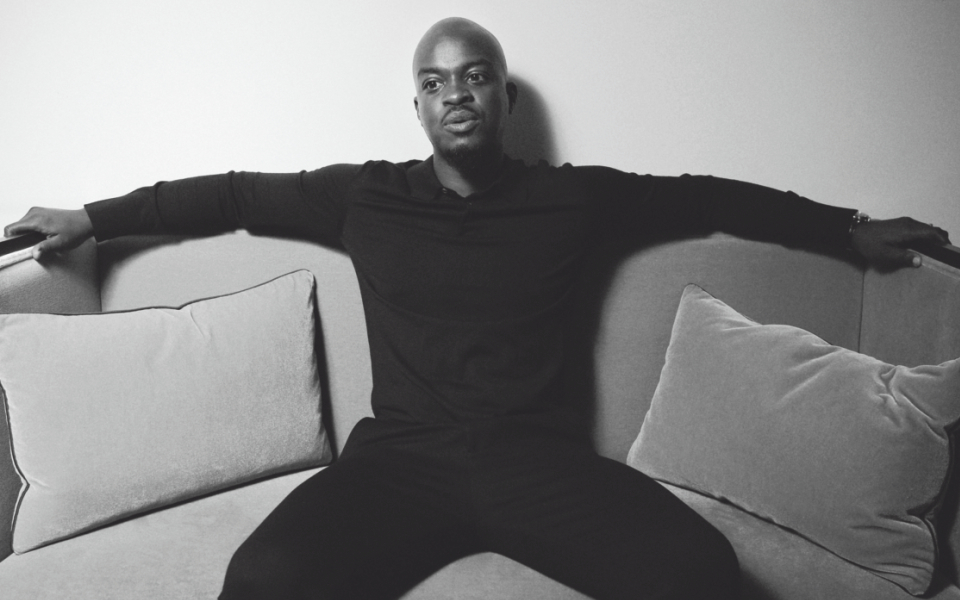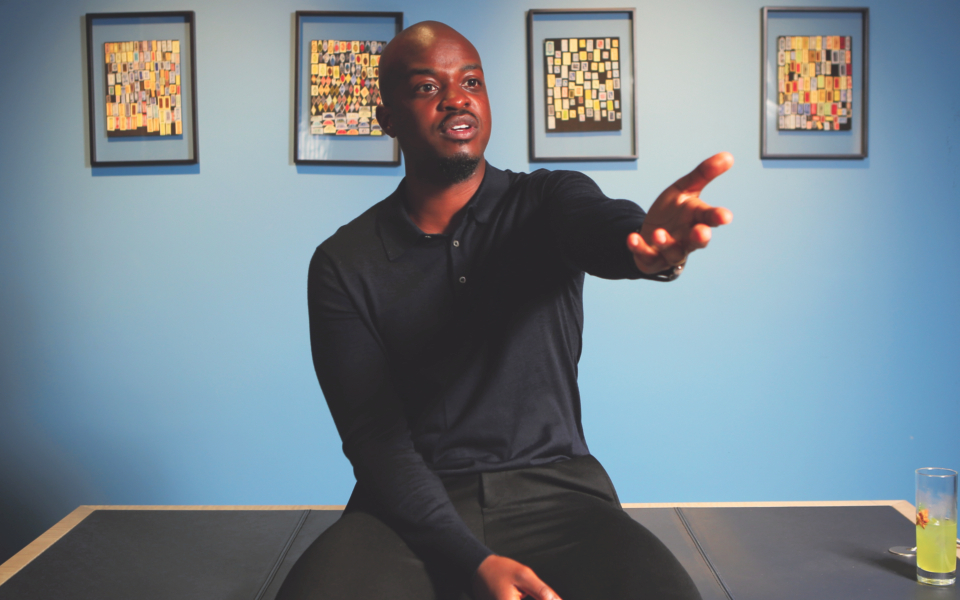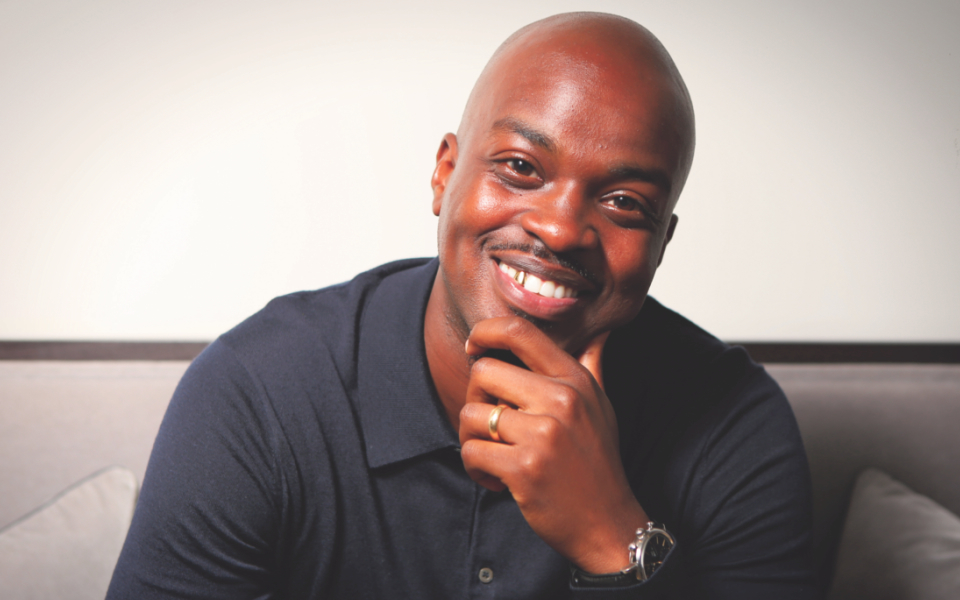George the Poet interview: George Mpanga on how to change the world

It seems almost unbelievable that Harry and Megan’s wedding – global audience: 1.9 billion – was opened by… a podcaster. But George Mpanga, better known as George the Poet, is no ordinary podcaster; he’s a musician and a thinker, pushing the boundaries of the medium so far he’s created a genre all of his own.
Writing about the hypnotic audio experience of Have You Heard George’s Podcast? is, to paraphrase Frank Zappa, a bit like dancing about architecture. Predominantly spoken word poetry, Mpanga creates heavily produced soundscapes that merge recorded interviews, ambient sounds, reportage, original music, even elements of ASMR.
He arrives fashionably late for our interview, flanked by his new wife and head of operations Sandra. He’s dressed in a tight, knitted jumper, his beard neatly trimmed, a gold tooth catching the light when he smiles. We’re ushered into the lower floor of a Bond Street boutique, where he’s booked to recite a poem he wrote for a partnership with Bushmills Whiskey.
We end up speaking for more than an hour, keeping the small crowd gathered upstairs waiting, and in that time there’s virtually no small-talk, the conversation bouncing between the weighty topics that underpin Have You Heard.

In person he speaks with the same confident fluency he does in the podcast, full of ideas, thoughts leaving his mouth already fully formed (there were mercifully few ‘ums’ and ‘ers’ to edit from the transcript). He comes across as serious and academic, laser focused, always scanning the horizon for the bigger picture.
None of this conflicts with the personality you might recognise through his podcast, social media channels (Instagram followers: 101,000; Twitter: 74,000), or TV appearances on shows including News Night. He’s engaging, articulate, not without a sense of humour but preferring to cut to the chase. Our interview sometimes feels like I’m sitting in on an interactive episode of his podcast. I guess when poetry is your trade, you learn not to spend words cheaply.
Over three seasons of Have You Heard he has crafted an intricate collection of essays touching upon subjects as diverse as love, prison reform and black history, all delivered in his distinctive, melodic style. As the podcast progresses, a central thesis emerges: that through music working class black communities create something of near-limitless cultural and economic value.
“Young black teenagers have made music that has gone on to change the world,” he says. “It has represented us. It has become a form of soft diplomacy. It establishes connections and builds bridges where there were none. This is just kids having a good time but it’s valuable.”
This has made mega-stars of artists, but the associated revenues tend to flow upwards to record companies rather than down into communities. Mpanga wants to see a world where the lawyers and designers and publicists and countless others involved in taking talent and turning it into a commodity come from the same place as the music.
“We need to renegotiate the contract,” he says. “Work out the terms, push for a better deal. Ultimately that’s about a form of education that invites young people into conversations about society.
“But we have to keep telling our story because we’re onto something. I’m 15 years into my journey as a writer and I’m convinced that storytelling can help a community take control of their destiny. We’ve got a lot of storytellers, from Dizzee Rascal to Dave, and they’re all from the same experience system. So I’m like, I know the story that we need to tell, it’s our story.”
Mpanga’s fascination with the music industry is no coincidence. “I didn’t sit in my room and be like ‘I don’t like the industry’,” he says. “I tried the industry first.”

He learned to MC when he was still in school, going on to build a reputation as a rapper. His debut EP, The Chicken and the Egg, was shortlisted in the Critics’ Choice category at the 2015 Brit Awards and he received praise everywhere from the BBC to Vice. Before it was even released, however, he quit his label. For most artists this would have killed the golden goose – who gets one shot at fame, let alone two?
“When I got to [Cambridge] university it occurred to me that you could do poetry instead of rap. That was a removal of the rules: I stopped rapping to a beat. Then I just kept removing more rules.” He says the “length of the medium” drew him to podcasting, with audiences expecting episodes to last 20 minutes or more, as opposed to the three minutes of a standard album track. In six episodes he can create as much content as three studio albums, which could take years to record.
He also took his time to develop his style. “For a year, I didn’t release anything – I just listened. I was watching the news. Watching documentaries. Travelling. Speaking to people. Listening to my infant nephews. The listening is what keeps the output flowing.”
After its first season, Have You Heard was snapped up by BBC Sounds, winning five awards at the 2019 British Podcast Awards, including Podcast of the Year, and it’s the only show outside of the US to win a prestigious Peabody Award.
Despite all the acclaim, Mpanga says he’s felt like an outsider for much of his life. He was born to Ugandan parents on the predominantly Jamaican St Raphael’s Estate in Brent, north-west London. Unlike many of his neighbours, his family was highly educated, his mother teaching him about African history from a young age and coaching him through his 11-plus.
This helped him get into an elite secondary school, where he was one of the few black kids. He says he learned to hustle, not selling drugs like some of those he grew up with, but clothes from the market to his nerdy classmates who wanted to be cool.
He was accepted by Cambridge University – to his surprise, apparently – where being a kid from a council estate is still relatively unusual (“Cambridge is a white space but my education was mine, it can’t be taken from me – that’s something I want to offer to more people, not just young black people but everyone who feels that they face challenges that are bigger than them”). Then he made his name in podcasting, a medium so stereotypically white there’s even a joke about it (‘what did one white dude say to the other white dude? Wanna start a podcast?’).
“These things force you to tell the story of who you are, otherwise you are just going to be intimidated and you are going to be overwhelmed by how different everyone else is. As a means of survival, right? Because you need to be able to establish and defend who you really are otherwise you are going to lose that truth to whatever is imposed on you.”
He’s now studying towards a PhD at University College London, researching… the economic and cultural potential of black music, of course, taking the thesis from Have You Heard and supercharging it.
“A couple of years ago I read this book called The Value of Everything by an economist called Mariana Mazzucato [now his tutor at UCL]. It’s about economic storytelling: where we believe value comes from, who we are told makes value, who doesn’t make value. And that book just aligned with so much of what I felt in my spirit about music. Through my research, I want to be able to explain all this to policy-makers, people who can change the flow of investment across communities.”

As if all this wasn’t enough to keep him busy, Mpanga’s side projects include sending children on the school trips they missed during the worst of the pandemic, working with prison inmates, helping African youths living with HIV, as well as taking on commercial gigs like the Bushmills whiskey promotion.
He says the jobs he accepts have to be on brand, and that when Bushmills asked to collaborate he was drawn to the message about sharing stories. “You can blend stories like blending a whisky. I love the flavour of the streets for example, but I also love the flavour of Cambridge University, I want to blend that.”
So what’s next on the agenda? Little would surprise me – academic, Poet Laureate, Prime Minister? “To be honest I don’t know. Where I feel that I’m most effective, that’s what I’m going to gravitate towards.”
As we’re being ushered out, Mpanga to perfectly recite a poem without any notes, me to enjoy a glass of whiskey and try to digest our dizzying conversation, I ask why he doesn’t appear to do many interviews.
“I think you’ve only got a finite number of words.”
So don’t waste them on journalists?
“Just don’t waste them,” he smiles.
• Bushmills’ Causeway Collection 2000 First Fill Port Cask is available at Hedonism Wines, Selfridges and The Whiskey Exchange, among others. Bushmills 1991 Madeira Cask is exclusive to The Whisky Shop.
